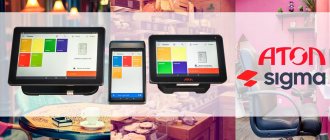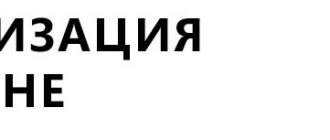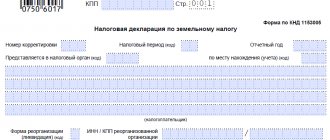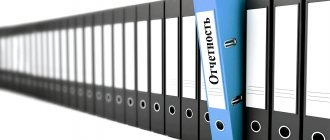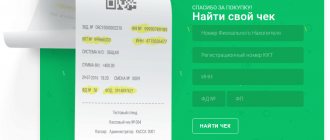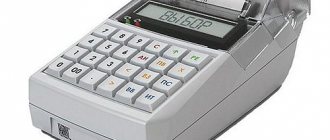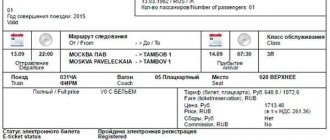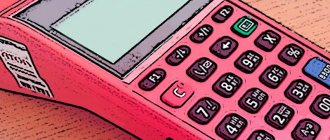Online cash register for non-cash payments to individuals
Before the adoption of the commented amendments, there was uncertainty as to whether it was necessary to use a cash register if the buyer, an individual, transferred money to the seller’s bank account.
The fact is that, according to paragraph 1 of Article 1.2 of the Federal Law of May 22, 2003 No. 54-FZ on the use of cash register systems (hereinafter referred to as Law No. 54-FZ), cash register equipment is generally used by all organizations and entrepreneurs when making payments. Let us say right away that this rule has been preserved in the new edition of Law No. 54-FZ. But the very concept of “calculations” has undergone serious changes. Previously, settlements meant the acceptance or payment of money using cash and (or) electronic means of payment. Experts argued whether a non-cash transfer from the buyer's account to the supplier's account falls under this definition. Officials claimed that it was covered (letter of the Ministry of Finance of Russia dated April 28, 2017 No. 03-01-15/26324, see “Ministry of Finance: when paying for goods non-cash through a bank, the seller is obliged to use cash register systems”). Experts expressed a different opinion, according to which the calculation is to transfer money through Internet banking, or through systems similar to the classic “bank-client”. If the client personally came to the bank and brought a payment order drawn up on paper (or filled it out on the spot), then during such an operation electronic means of payment are not used. Therefore, this type of non-cash payment does not apply to payments and does not require the use of cash register systems.
According to the amendments, settlements mean the acceptance (receipt) and payment of funds in cash and (or) by bank transfer. Thus, from now on, any non-cash transaction, along with cash payments, obliges the seller to use cash register equipment.
There are also clear rules regarding when, for non-cash payments, the seller must issue a cashier's check, and in what way the check should be transferred to the buyer. Thus, the check should be generated no later than the business day following the day of payment, but no later than the moment of transfer of the goods (new clause 5.4 of Article 1.2 of Law No. 54-FZ). You can send a check via the Internet to the client’s phone or email address. A paper receipt is usually given to the customer along with the goods. But there is another way - to give a paper check at the first direct interaction between the client and the seller or his authorized person (new clause 5.3 of Article 1.2 of Law No. 54-FZ).
Let us add that legislators have allowed temporarily not to generate cash receipts in a situation where an individual buyer comes to the bank and brings a “paper” order to transfer money, or fills it out on the spot. The deferment also applies when an individual pays for utilities or accepts a refund from the seller for a previously made advance. Under such circumstances, the seller has the right not to issue cash receipts until July 1, 2021. This is expressly stipulated in Part 4 of Article 4 of the law being commented on.
How do online cash registers work?
CCT with the function of real-time data transmission works on a different principle than previous devices with ECLZ. First, information about the sale goes to the intermediary - the fiscal data operator. After the operator receives sales data from the cashier via the Internet, he sends confirmation that the data has been accepted.
A cash register receipt is assigned a fiscal attribute; without this, the receipt will not be generated. It is assumed that the acceptance of data and assignment of a fiscal indicator will take place in just 1.5 - 2 seconds, so the payment process for the buyer will not be delayed. The operator then transmits summary information about payments to the tax office, which systematizes it and accumulates it in a data warehouse.
All data transmitted to the INFS by fiscal data operators will be taken into account in calculating the tax base. For violation of the completeness of information collection, the operators themselves are punished with serious fines (from 500 thousand to a million rubles).
Please note: OFD is a commercial specialized organization that has the necessary technical resources and qualified workers. You must also choose an operator, following the recommendations of the Federal Tax Service, from the official list.
The buyer receives a paper check, which indicates the data operator’s website and the fiscal sign of the check. If desired, the buyer can request the seller to send the check electronically. If it turns out that the details of the paper check and the electronic one do not match, the buyer has the right to report this to the Federal Tax Service, which will check this fact.
Settlements between organizations and individual entrepreneurs
Both the previous and the new editions of Law No. 54-FZ say that when making payments between two organizations, two individual entrepreneurs, or between an organization and an individual entrepreneur, cash register equipment must be used in two cases. The first is the acceptance and withdrawal of cash. The second is the acceptance and issuance of non-cash funds using an electronic means of payment with its presentation (for example, using a plastic card). As for all other non-cash payments, they are not covered by the CCP law.
Until the end of June 2021, checks issued for settlements between companies and entrepreneurs will be the same as for settlements with individuals. But from July 2021, a new paragraph 6.1 of Article 4.7 of Law No. 54-FZ will come into force. It states that when making payments between legal entities and individual entrepreneurs, it is necessary to issue a check, which must contain additional details. This is the name of the buyer (that is, the name of the organization or full name of the entrepreneur) and the TIN of the buyer. Plus, the receipt will have to indicate the following data (if available): information about the country of origin of the goods; excise tax amount and registration number of the customs declaration.
Please note: you can fulfill all the requirements of the current version of Law 54-FZ for the details in the cash receipt using the “Kontur.Market” service. The service also ensures the transfer of data on punched checks to the INFS through the OFD. In addition, “Kontur.Market” is integrated with the service for maintaining records and submitting reports “Kontur.Accounting”, which allows you to quickly and accurately reflect sales data in tax and accounting.
A complete set for online cash register: for the price of a cash register you will receive a cash register, OFD and the Kontur.Market product accounting system Send a request
Chronology of the transition to cash register online
The transition to a new type of cash registers began as an experiment by the Ministry of Finance and the Federal Tax Service back in August 2014. For six months, the viability of the idea of transmitting data about a purchase made in real time to the tax office via the Internet was tested. New generation cash registers connected to the Internet were the first to be tested by retailers in Moscow and the region, Tatarstan and Kaluga region; in total, about 3 thousand units of cash register equipment were used.
The Ministry of Economic Development did not approve the bill and twice issued a negative opinion on assessing its regulatory impact. Business was also against it, as news feeds wrote about more than once. At one of the meetings with the leaders of entrepreneurs’ associations, the head of the Federal Tax Service of Russia, Mikhail Mishustin, proposed, as a concession, to make the process of transition to new CCPs step-by-step.
Tax officials cite the following advantages of the new model cash registers:
- registration of cash registers in electronic form;
- objective accounting of sellers’ income;
- reducing the number of tax audits;
- providing consumers with greater opportunities to protect their rights.
In addition, on behalf of the President, businessmen were promised a special tax deduction to cover the costs of purchasing new cash registers. However, only individual entrepreneurs received this benefit for EVND and PSN, and only in the amount of no more than 18 thousand rubles per unit of cash register.
Innovations for individual entrepreneurs on PSN
General case
According to the previous version of Law No. 54-FZ, most entrepreneurs with a patent should have started using online cash registers from July of this year. However, the commented amendments generally relieved individual entrepreneurs on PSN from this obligation. The new paragraph 2.1 of Article 2 of Law No. 54-FZ states that entrepreneurs on PSN may not issue a cash receipt if, in return, they issue customers a document confirming the fact of payment. For convenience, we will call it a special document.
The special document must contain the name and serial number, as well as some details required for a cash receipt: the seller’s TIN, his tax system, etc. (a complete list of details is given in paragraphs 4-12 of paragraph 1 of Article 4.7 of Law No. 54-FZ). It is not necessary to indicate only those details of the check that relate to the cash register, for example, the registration number of the cash register, fiscal sign, etc.
Exceptions
However, there were some exceptions. According to the new edition of Law No. 54-FZ, those individual entrepreneurs in the patent system who are engaged in the following types of activities will still have to use CCP:
- hairdressing and beauty services;
- repair and maintenance of household radio-electronic equipment, household cars and household appliances, watches, repair and manufacture of metal products;
- maintenance and repair of motor vehicles and motor vehicles, machinery and equipment;
- road freight and passenger transportation;
- veterinary services;
- conducting physical education and sports classes;
- provision of services for the transportation of passengers and cargo by water transport;
- management of hunting and hunting;
- engaging in medical or pharmaceutical activities;
- rental services;
- retail trade and catering services;
- production of dairy products;
- commercial and sport fishing and fish farming;
- repair of computers and communication equipment.
At the same time, these individual entrepreneurs (except for those involved in retail and catering) have been given a deferment: they may not issue cash receipts until July 1, 2021.
Calculate the cost of a ready-made solution for connecting an online cash register
If an individual entrepreneur has taken advantage of the deferment, then until July 2021 he can issue sales receipts, receipts or other simple documents confirming payments to customers. A simple document must meet certain requirements, but these are different from those required for a special document. So, in a simple document you need to indicate the following details: name, serial number, date of issue, name or full name of the seller, his tax identification number, name and quantity of goods, payment amount, as well as the position, surname, initials and personal signature of the issuing person.
Also see “New amendments to the law on cash registers: who will be completely exempt from using online cash registers.”
Who was charged with the duty of punching cash receipts?
After the amendments to Law No. 54-FZ are finally adopted, organizations and individual entrepreneurs will have the obligation to issue absolutely all non-cash payments using a fiscal check for any payment method:
- cash electronic money;
- payment order;
- by bank card;
- transfer via online banking;
- by receipt through the bank.
We are talking about those types of activities where the use of online cash registers remains mandatory even after amendments to Law No. 54-FZ, which came into force at the end of 2021.
Innovations for vending machines
According to the old rules, the cash register, which was used as part of a vending machine, had to be installed inside its body. The commented amendments introduce a number of exceptions to this general rule. Thus, the online cash register may be located outside the machine body, which charges fees for services for the transportation of passengers, luggage, cargo and cargo luggage. In this case, it is necessary that the easily readable serial number of the vending machine is located on the case in an accessible place. If all conditions are met, then the cash register, located separately from the machine, may not issue checks, and if the buyer did not provide his email address or phone number, then the online cash register may not send checks via the Internet (new sub-clause 1, clause 5.1 and p. 5.2 Article 1.2 of Law No. 54-FZ).
From February 2021, it will be allowed to install a cash register separately from the machine if its display displays a QR code that allows the buyer to read and identify an online receipt. If you use such cash registers, you don’t have to print or send checks to customers. True, there is an additional condition here - the machine should not sell excisable or technically complex products and goods subject to mandatory labeling (new subparagraph 2, paragraph 5.1, article 1.2 of Law No. 54-FZ).
There are also innovations for machines where payments are made exclusively with coins. If these machines are not powered by electrical energy, including batteries, then there is no longer a need to install cash register equipment in them (new clause 1.1 of Article 2 of Law No. 54-FZ).
Costs of switching to online cash registers
If you already work with a cash register, then it can be upgraded. Some models allow you to simply replace the ECLZ with a fiscal drive, rather than purchasing new equipment.
These are the approximate expenses that entrepreneurs will have to bear:
- modernization of an old device - from 5 to 10 thousand rubles;
- purchasing a new device – from 25 to 40 thousand rubles;
- cash register software – from 7 thousand rubles;
- operator services (OFD) - from 3 thousand rubles for the first year of work, in subsequent years - up to 12 thousand;
- Internet connection – from 5 thousand rubles per year.
Total, at least 20 thousand rubles if your equipment can be modernized, or 40 thousand rubles if this is not possible.
Order No. 616 of the Ministry of Telecom and Mass Communications of Russia dated December 5, 2021 allows the use of old cash register models in populated areas with a population of up to 10,000 people instead of online cash registers.
Innovations for payment agents and insurers
In Article 1.2 of Law No. 54-FZ, a new paragraph 5.5 appeared, dedicated to payment agents and subagents who make payments using automatic devices. The new rule obliges them to issue cash receipts on paper or send them electronically. There is an alternative option: send the client information identifying the online check. These include: registration number of the cash register, amount, date and time of payment, etc. Using this information, the client will be able to find and receive his check for free on the online information resource indicated by the seller.
Amendments are also provided for insurers. The new paragraph 11 of Article 2 of Law No. 54-FZ is addressed to insurers who pay policyholders through agents who are not organizations or individual entrepreneurs. In such a situation, the insurer is obliged to issue a check or strict reporting form in electronic form and send it to the policyholder.
Complete set for online cash register: cash register at a special price, OFD, configuration of cash register with registration with the Federal Tax Service and a discounted inventory system Send a request
Making checks for remote payment
Remote payment for goods does not exempt the seller from using a cash register and issuing cash receipts to the buyer. Moreover, previously it was not clear how sellers could ensure the production/transfer of a receipt at the time of payment for the goods (Clause 2 of Article 5 of Law No. 54-FZ).
Now legislators have taken into account the specifics of distance trading and have written down in paragraphs. 5.3-5.4 art. 1.2 of Law No. 54-FZ special rules for the use of online cash registers and issuance of checks for such cases. Now, when trading remotely, a cash receipt/BSO must be prepared no later than the business day following the day of settlement. In this case, the check cannot be issued later than the moment of transfer of the goods. That is, today they paid, tomorrow delivery - tomorrow a receipt, today they paid and delivered today - the receipt is also today.
The check can be sent to the buyer in one of the following ways:
- In electronic form to a subscriber number or e-mail (the check is sent no later than the business day following the day of settlement).
- On paper along with the goods without sending an electronic receipt.
- On paper, during the first direct interaction between the buyer and the seller without sending an electronic receipt.
Types of activities that do not require the use of CCP
Legislators have adjusted the list of activities that allow not to use cash register equipment. Here are the main changes:
- it has been clarified that the exemption from CCT applies only to newspapers and magazines printed on paper;
- a condition has been added that peddling trade in goods subject to mandatory marking with means of identification does not fall under the exemption from CCP;
- the exemption from CCP has been extended to peddling trade on board aircraft (previously it was only valid for trains, handcarts, bicycles, baskets and trays);
- The sale of bottling milk and drinking water was exempted from the use of CCP (previously the sale of ice cream and soft drinks was exempt);
- Paid services provided by state and municipal libraries are exempt from the use of cash registers;
- the provision of paid parking spaces on public roads and on regional, municipal and land plots is exempt from the use of CCP;
- From July 1, 2021, the exemption that was in effect for the sale of travel tickets in public transport will be cancelled.
What's happened?
Russian President Vladimir Putin signed the law “On Amendments to Certain Legislative Acts of the Russian Federation.” The author of the bill was the Government of the Russian Federation; it is aimed at optimizing the new procedure for using cash register equipment with the function of transmitting data online to the tax authorities (CCT). The document provides for both tightening the use of online cash register systems, in particular the mandatory printing of a fiscal receipt for all non-cash payments, and a number of concessions for business, for example, exempting sellers from issuing cash receipts when repaying advances for some services provided. Let's take a closer look at who will have to use cash registers from July 1, and who, on the contrary, will be able to do without them without fear of getting a fine. But first, remember what is being discussed in the Federal Law of May 22, 2003 N 54-FZ.
What has changed in the processing of checks and BSO
The law under comment contains amendments regarding the mandatory details of a cash receipt and a strict reporting form. Firstly, there was a clarification that the price per unit must be indicated in the currency of the Russian Federation. Secondly, the wording of the form of payment has changed: previously it was “cash” and (or) “electronic”, now it has become “cash” and (or) “non-cash”. Thirdly, the QR code has become a mandatory requisite for a cash register receipt and BSO (Clause 1, Article 4.7 of Law No. 54-FZ, as amended).
In addition, from July 2021, special rules will come into force for checks and BSOs, which are issued when paying out winnings in the lottery and gambling, as well as when receiving an insurance premium and when receiving an insurance payment. In such checks and BSO, in addition to the usual details, you will need to indicate the name or full name of the client or policyholder, and his TIN (for an individual - the series and number of the passport). This is provided for by the new paragraph 6.2 of Article 4.7 of Law No. 54-FZ.
Changes for fiscal drives
Until recently, only two types of fiscal drives were presented on the market: with a validity period of 36 months and a validity period of 13 months. Now they have added drives with a validity period of 15 months. It is possible that in the future there will be drives designed for a different period.
Legislators took these changes into account. Previously, paragraph 6 of Article 4.1 of Law No. 54-FZ stated that in general, users in special modes are required to use fiscal drives with a validity period of at least 36 months. And only for some users (in particular, for those combining special mode and OSNO) it was allowed to use a drive with a validity period of at least 13 months. After the adoption of the commented amendments, the same users are allowed to use fiscal accumulators with a validity period of less than 36, but not less than 13 months. We see that drives with a maturity of 15 months fall into this period.
Buy a fiscal drive and enter into an agreement with the OFD
When to buy Kassa-KKT?
It is advisable to purchase an online cash register today, since more than 3 million businesses are expected to register.
In 2021, according to experts, at least 1.2 million cash registers were put into operation. Businessmen purchasing devices at the end of the term were faced with queues. They installed the cash registers in violation of the deadlines and were fined. In 2021, the fiscal storage devices installed 13 months ago will expire. A deficiency may occur.
After the purchase, you must register the cash register with the tax authorities, on the nalog.ru portal, or at the service center. Existing equipment can be upgraded and re-registered. To do this, you need to make sure that this model is present in the Federal Tax Service register.
